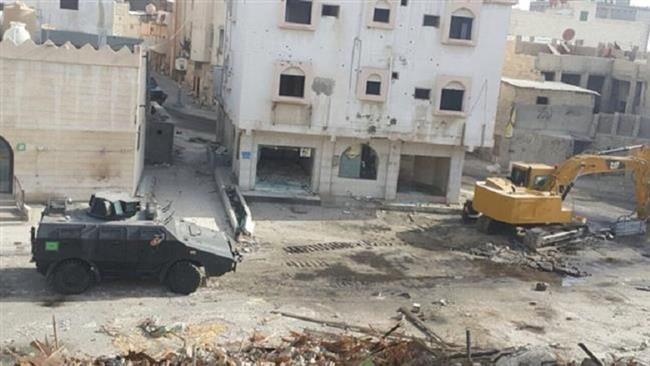Alwaght-Saudi regime force have killed at least five people in eastern province in two days of brutal crackdown on Shiite Muslims from the town of Awamiya in Qatif district.
Activists on social media said three local residents and two expatriate workers have been killed since the security operation began early on Wednesday when a column of armored vehicles entered Awamiya.
Activists posted photos of several people they said had been hit, including the dead. Others have been wounded, but no precise figures were immediately available.
They identified the three local residents killed as Mohsen al-Awjami, Mohammed al-Faraj and Hussein Abu Abdullah, but gave no details on the expatriates.
A relative of Awjami said the 42-year-old man was returning home from work when he was shot by security forces.
Officials from the region's main Qatif Central Hospital declined to comment when reached by telephone, saying they were not authorised to speak to the media.
Activists posted a picture of another dead man they identified as Faraj, a bearded young man on a dark road with a bulge in his side, apparently from a projectile that hit him.
Qatif is an oil-rich region of Saudi Arabia where many of the country's Shiite Muslim minority live and witnessed protests against discrimination and persecution by the ruling Wahabbi regime.
Saudi forces started their brutal attack on Awamiyah town on May 10, using helicopter gunships and heavy weapons. The Saudi regime claims the aim of the raid is to allow ‘renovation’ of the historic al-Mosara neighborhood to make way for a planned a new project.
Awamiyah, a town of 30,000 in the Shiite Muslim-majority Qatif district in the Eastern Saudi province, was the home of Sheikh Nimr al-Nimr, a high ranking Shiite scholar who was unjustly hanged in January last year for demanding the legitimate rights of the region’s residents.
Several policemen have been killed in attacks by militants since that demolition work began.
The planned "renovation" of the historic 400-year old al-Mosara district has been highly controversial. In April, the United Nations called on the Saudi government to halt the project, warning that it threatened "the historical and cultural heritage of the town with irreparable harm".



























